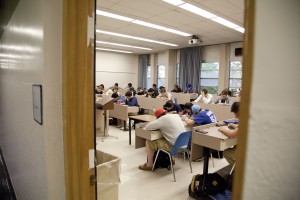‘Mixed reviews’ for PASS


In 2010, the global studies department at Wilfrid Laurier University implemented an integrated academic teaching and support program to their first-year courses as a replacement for tutorials. Peer Assisted Skill Sessions (PASS) are taught by fourth-year global studies students, rather than contract academic staff, as many of the upper-year global studies tutorials are.
Michael Carroll, dean of the faculty of arts, explained that each department decides where they want to allocate resources and how tutorial sessions are run.
“This is something departments decide for themselves, within the resources available to them,” he said. “Because resources these days are indeed limited.”
As such, PASS is an example of how a department can modify tutorials within a department.
Sara Matthews, an assistant professor of Global Studies, is teaching GS101 for the first time this term, which is also her first interaction with PASS. Over the summer, she worked with Michael Lisetto-Smith, who was in charge of developing the PASS program, to rework the sessions.
“I have heard that in previous years people have had mixed reviews on how successful that has been, so I’ve tried to take a lot of that feedback into account and then to build a more robust relationship with PASS this year,” she explained. “So my impression is, halfway through the term, that that’s going quite well.”
According to Matthews, PASS is effective for first-year students because it teaches academic skills that prepare them for second-year tutorials, which are more content-focused.
“It’s not as though I don’t have my critiques or misgivings about the system. But I have to find creative ways of working within the environment to make it the best possible situation,” said Matthews. “It would be great if we didn’t have first-year courses with 450 students. But we do, so given that reality how do we create an experience that will be the best one for those students in my class?”
But Matthews said she has heard few negative comments from students.
“I haven’t heard anybody say to me anything about a feeling that they are not a good use of their time. The sessions are very well-attended.”
However, Nicole Vaughan, a third-year psychology student who took a first-year global studies elective which included a PASS session, did not feel it was overly beneficial.
“I think I would have preferred it be a tutorial,” said Vaughan. “It’s good information to present to students, but it could just be in less time.”
Sara Anderson, a fifth-year global studies major who is currently a PASS peer assistant, admitted that she is aware of some frustrations students have about wanting to focus on the content that they need to know for the course.
“I don’t know if it’s more effective or not, it’s just focusing on different things,” Anderson said, speaking from her experience with both first-year tutorials and PASS. “For tutorials, you want to learn course content and that’s really the goal. These are different in that they are trying to provide university students with a more holistic understanding of what university is.”
She did note, however, that students are missing out on teaching assistants (TAs) that are “cornerstones of the global studies department” and hopes that they will have the opportunity to experience them in second-year.
“On one level, though, we provide something else that TAs at the masters and PhD level don’t have, and that is we are students and we just went through this very experience very, very recently,” Anderson continued.
“I find the students feel a little more comfortable approaching us. So there’s give and take here.”


